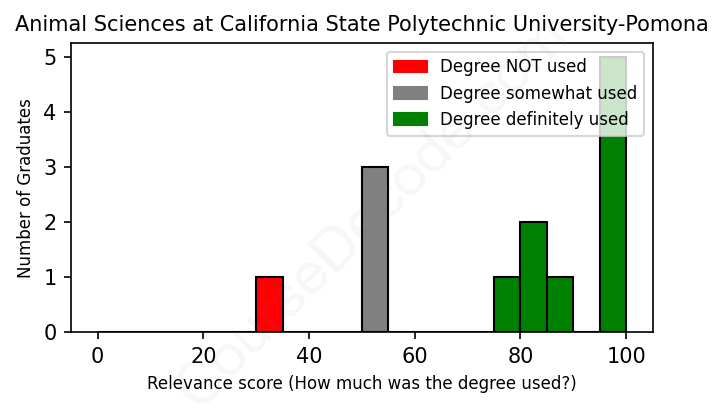
First, some facts. Of the Animal Sciences graduates from California State Polytechnic University-Pomona we've analyzed , here's how many have used (or NOT used) their degree in their career:

These are estimates based on AI analysis of 13 LinkedIn profiles (see below).
The verdict? Significantly above average. Overall, with an average relevance score of 78%, Animal Sciences graduates from California State Polytechnic University-Pomona have a much higher likelihood (+11%) of finding work in this field compared to the average graduate across all fields:
And for comparison, here's the chart for all profiles we've looked at across all degrees.
Also, after graduating, only 30% of these graduates have pursued further education other than another Bachelor's degree (such as a Masters degree or other), compared to the average across all profiles of 35%. This suggests a Bachelors degree is enough for most Animal Sciences graduates, and it's normal to look for work straight after graduation.
See the details:
|
Relevance score: 54% We think this person has gone into a career only somewhat relevant to their degree. We think this person has gone into a career only somewhat relevant to their degree.
DEGREE INFOGraduated in 2016 from California State Polytechnic University-Pomona with a Bachelor of Science (B.S.) in Animal Sciences. No other secondary education since. JOB HISTORY SINCE GRADUATIONField Biologist Assistant (Seasonal) Santa Ana Watershed Association Mar 2016 - Jul 2016 Field Biologist Assistant (Seasonal)  Santa Ana Watershed Association Mar 2017 - Jul 2017 Veterinary Assistant  VCA Aug 2017 - Present ABOUTNo information provided. |
The top 10 most common jobs done by the graduates we've analyzed (ranked most common to least) are:
So, if we take a look at the job paths of graduates from California State Polytechnic University-Pomona’s Animal Sciences program, we see a mix of roles, but many of them do lean towards the animal care and veterinary fields. Some of the most common jobs are Veterinary Technicians, Veterinary Assistants, and various coordination roles in veterinary settings, like the Surgery Supervisor or Milk Bank Coordinator. These jobs often require strong foundational knowledge in animal care and biology, which is right in line with what they studied in college. There are also roles like the Food Inspector at USDA, which definitely tie into larger food safety concerns related to animals, again highlighting that connection to their degree.
However, not all roles are directly relevant to Animal Sciences. Some individuals ended up in completely unrelated fields like retail or real estate, which really shows the diversity of career paths available but also makes you wonder how much of their education they got to use in those jobs. While many graduates found positions that allowed them to apply their knowledge directly, a few ended up in roles that didn't leverage their specialized education at all. Overall, it’s a real mixed bag—some are doing stuff super relevant to their degree, while others are just kind of winging it in different industries.
Here is a visual representation of the most common words in job titles for Animal Sciences graduates (this is across all Animal Sciences graduates we've analyzed, not just those who went to California State Polytechnic University-Pomona):

From the LinkedIn profiles of graduates of California State Polytechnic University-Pomona with degrees in Animal Sciences, it appears many of them have embarked on meaningful career paths that align closely with their field of study. For their first jobs after graduating, many landed roles as veterinary technicians, assistants, or in similar support roles at various animal hospitals and organizations. This initial focus on hands-on experience in the animal care sector is indicative of a strong foundation in the field, setting the stage for further advancement.
As these graduates gained experience, many transitioned into more specialized roles or management positions. For example, some moved on to become veterinary practice managers or even coordinated outreach programs for animal welfare organizations. In the longer term—about five to ten years after graduation—it's common to see them take on significant roles such as field biologists, QA technicians, or even positions in larger organizations like the USDA. While a few individuals have taken paths that diverge from animal sciences, such as becoming real estate agents or customer experience managers, a majority have successfully remained within animal-related careers, reflecting a solid career trajectory for those passionate about the field. Overall, it seems like a decent number of these graduates have found fulfilling careers that align with their studies, showcasing the diverse opportunities available within Animal Sciences.
Alright, so here’s the deal with a Bachelor’s degree in Animal Sciences at Cal Poly Pomona: it’s definitely on the challenging side, but it’s not impossible! You’ll be diving into subjects like animal biology, nutrition, and genetics, which can get pretty intense, especially with all the lab work involved. There’s a good mix of hands-on experience, which is super cool, but be prepared for some late nights studying for exams or working on projects. If you’re passionate about animals and science, the workload feels manageable and can be totally rewarding. Overall, it’s about average in terms of difficulty compared to other science-focused degrees, but your love for the subject will definitely help keep you motivated!
Most commonly, in the LinkedIn profiles we've looked at, it takes people 3 years to finish a Bachelor degree in Animal Sciences.
So, looking at these Animal Sciences grads from Cal Poly Pomona, it seems like they've landed jobs that can give them a decent living, but it varies a lot. Some have more stable career paths in places like veterinary clinics, which typically pay better with experience, while others, like those involved in sales or customer experience, might not see as high a salary right off the bat. For example, the Milk Bank Coordinator and Territory Manager roles probably offer better pay than some of the assistant or entry-level positions. Overall, while they're making a living in roles they probably enjoy, the paychecks might not always be what you'd expect for someone with a degree—definitely better than minimum wage, but maybe not as high as they'd like.
Here is a visual representation of the most common words seen in the "about" section of LinkedIn profiles who have a Bachelor degree in Animal Sciences (this is across all Animal Sciences graduates we've analyzed, not just those who went to California State Polytechnic University-Pomona). This may or may not be useful:

Here are all colleges offering a Bachelor degree in Animal Sciences (ordered by the average relevance score of their Animal Sciences graduates, best to worst) where we have analyzed at least 10 of their graduates:
| College | Score | Count |
|---|---|---|
 Purdue University Purdue University
|
80 | 14 |
 California State Polytechnic University-Pomona California State Polytechnic University-Pomona
|
78 | 13 |
 North Carolina State University North Carolina State University
|
77 | 18 |
 Iowa State University Iowa State University
|
75 | 25 |
 University of Missouri-Columbia University of Missouri-Columbia
|
75 | 12 |
 South Dakota State University South Dakota State University
|
73 | 10 |
 The Ohio State University The Ohio State University
|
71 | 21 |
 University of Florida University of Florida
|
68 | 15 |
 University of Vermont University of Vermont
|
68 | 12 |
 Michigan State University Michigan State University
|
67 | 20 |
 University of California, Davis University of California, Davis
|
66 | 27 |
 University of Illinois at Urbana-Champaign University of Illinois at Urbana-Champaign
|
63 | 16 |
 University of Tennessee, Knoxville University of Tennessee, Knoxville
|
61 | 13 |
 University of Arkansas University of Arkansas
|
60 | 10 |
 California Polytechnic State University-San Luis Obispo California Polytechnic State University-San Luis Obispo
|
59 | 22 |
 University of Wisconsin-River Falls University of Wisconsin-River Falls
|
58 | 10 |
 Texas A&M University Texas A&M University
|
54 | 34 |
 Penn State University Penn State University
|
53 | 14 |
 Texas Tech University Texas Tech University
|
51 | 12 |
 Kansas State University Kansas State University
|
51 | 22 |
 Oklahoma State University Oklahoma State University
|
43 | 16 |